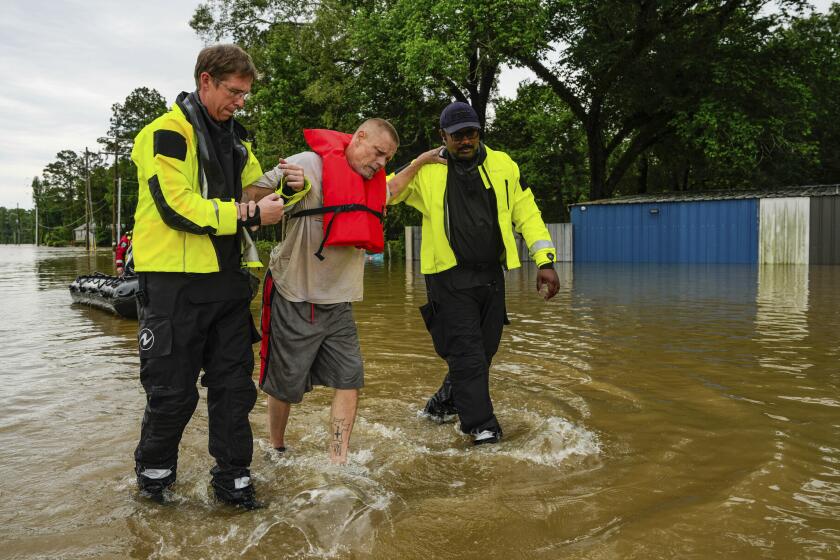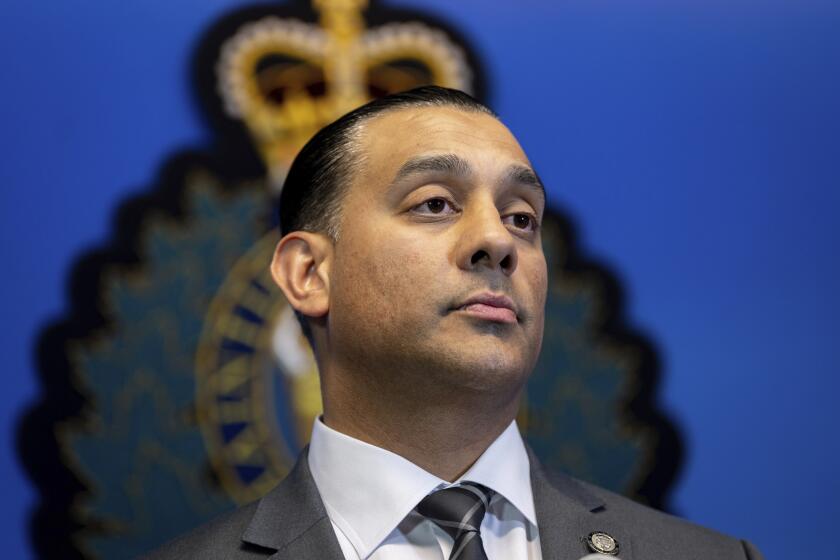Marines Say CIA Hampered Their Inquiry
The Marine Corps’ investigation of the Moscow embassy sex-and-spy scandal has been hampered because the State Department, Central Intelligence Agency and National Security Agency “have been less than totally cooperative,” according to internal military documents disclosed Friday.
“We must expect that civilian embassy officers/employees will be implicated as the investigation continues,” said an April 7 memo from the acting director of the judge advocate division to Marine Corps Commandant Paul X. Kelley.
The Justice Department and FBI “have got to become directly involved now,” the memo said in urging creation of a joint Defense Department-Justice Department task force.
‘Not Taken Seriously’
“We need the ‘clout’ which the FBI and attorney general can provide in dealing with the State Department, CIA and NSA, which to this point have been less than totally cooperative with our investigation and prosecution efforts,” the memo added. “We are not taken seriously, since our jurisdiction is limited rather than plenary.”
Kelley, questioned at a news briefing about the documents obtained by the MacNeil/Lehrer NewsHour, said the assertions were “quite correct” when he endorsed the memo and forwarded it to the secretary of the Navy on April 8, but “today I would not write that memorandum. . . . We now have full cooperation of everybody in town.”
Two former Marine guards at the Moscow embassy, Sgt. Clayton J. Lonetree and Cpl. Arnold Bracy, have been charged with espionage for allegedly allowing KGB agents to roam through secret areas of the U.S. government’s most sensitive diplomatic installation.
“Given the rapidly unfolding events and disturbing revelations of recent days, we can anticipate that NSIC (Naval Security and Investigative Command) efforts will disclose additional suspects,” said the three-page memo signed by M. E. Rice, who is acting director of the division handling prosecution of the cases.
“Some of these suspects will still be on active duty, but in view of the widening scope of the investigation, we must assume that others will now either be retired or discharged, and thus no longer amenable to military justice process,” the memo said.
Because “we must expect that civilian embassy officers/employees will be implicated,” it added, the FBI and Justice Department should become involved. “The FBI is the proper law enforcement agency to pursue these cases, and only the Department of Justice has jurisdiction to prosecute them,” it said.
Blunting Criticism
The memo said a joint military-civilian task force “would take the focus off the Marine Corps as well as put some distance between us and the investigation/prosecution. Thus, we could blunt any criticism that we were not vigorously pursuing the cases. This may become more important if officer cases are developed.”
No specifics were given in the memo to support the assertion that other agencies were not fully cooperating. However, it said: “For example, the CIA has already tried an end-run. . . . We still are not receiving the full cooperation of the CIA.”
Kelley, asked at the Pentagon briefing about this reference to the CIA, said “that situation does not exist” now. “I don’t have the specifics on an end-run as such,” he said when pressed by reporters.
The Marine commandant acknowledged that “we had some seams between agencies” when the investigation began but that they “were smoothed over. At the present time I am absolutely confident . . . we now have full interagency cooperation throughout the entire federal government.”
Reference to Weinberger
In an April 10 memo to his aides--a document also obtained Friday--Kelley said Defense Secretary Caspar W. Weinberger approved the proposal for a joint military-civilian task force “the same day it was forwarded,” and that he expected Atty. Gen. Edwin Meese III to approve it “at the appropriate time.”
A Pentagon spokesman said later Friday that the proposal is still under consideration.
At his first news conference since the Marine guards were accused of espionage, Kelley said the Soviets are attempting to use the case to “degrade and humiliate” the Marines and pleaded with the American people to maintain their faith in “the finest and most unique fighting organization in the world.”
“We honestly thought our system was working well,” Kelley said of the 40-year-old practice of assigning Marines to guard U.S. embassies abroad. “But, obviously, something went wrong in Moscow.” He added: “Fix it we will, and that’s a solemn promise.”
Shocked, Then Angered
The four-star general, whose four-year tour as commandant ends when he retires in June after 38 years in the Marines, said he was at first shocked and then angered by allegations that Marine guards allowed KGB agents to roam through secret areas of the Moscow embassy.
“We are a very close-knit organization. It borders on, with us, being a religion,” Kelley said. “We are a proud corps. And we must press on. We cannot allow the actions of a remote handful of individuals . . . to destroy our morale.”
In criticizing Soviet statements about the case, Kelley said he was confident that Americans would “address this subject with balance, with fairness and with objectivity.”
More to Read
Start your day right
Sign up for Essential California for news, features and recommendations from the L.A. Times and beyond in your inbox six days a week.
You may occasionally receive promotional content from the Los Angeles Times.






